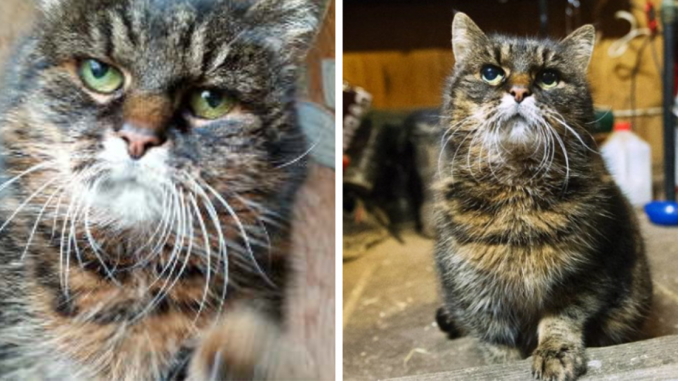
Missan, 35, maybe the world’s oldest cat, according to its Swedish owner who says that aside from suffering from some minor back and kidney problems, there is no reason why her furry friend won’t make it to the grand age of 36.
Missan the Swedish farm cat is turning 36 this spring and maybe the world’s oldest living cat. By far.
“I read an article about another cat that was supposed to be the world’s oldest, and I just thought to myself: ‘mine is older!’,” Nissan’s owner Åsa Wickberg, from Karlskoga, told the TT news agency.
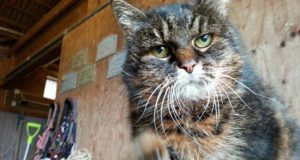
According to the Guinness Book of World Records, Poppy from Britain was listed as the world’s oldest cat last year at the age of 29…
Wickberg said she found Missan as an abandoned kitten in 1985, with the family dog quickly adopting her as one of her own.
“She’s a bit of a loner and has always been a bit shy and a little cautious. But she likes dogs. She takes to them very quickly.”
Although Missan’s age has somewhat taken its toll on her, with some back and kidney problems, it has been nothing that some cortisone and new eating habits haven’t been able to fix.
Wickberg is convinced Missan will make it to the age of 36.
“It feels highly likely,” she said…
Advances in medicine have allowed cats to live on average longer and healthier lives. However, like other animals, cats are not spared from senescence, which mainly affects their health, their physical, their reflexes, but also their behavior.
Some individuals see their quality of life deteriorate inexorably, to the point that the owner may be forced to ask himself the delicate question of the euthanasia of the cat. In these cases, the veterinarian remains an essential advisor and a formidable accompanist for the master who wishes to have his cat euthanized. After death, the veterinarian may also offer to have the cat cremated individually (to keep the ashes), or provide contact information for animal cemeteries.
Fortunately, before reaching these extreme considerations, the senior cat still has many happy years ahead of him, provided that the owner is aware of the changes in the age of his pet and that he takes some simple steps to simplify his life…
-chronic kidney failure
The elderly cat may suffer from chronic kidney failure and start urinating anywhere. Kidney failure of the senior cat, a major cause of death in the high ages, can be mitigated by specific dietary treatment if detected in time.
More than with another cat, it is important not to scold him if he urinates everywhere because the incontinence of the elderly cat is not his doing. For example, you can install bores (sold in a nursery shop or pharmacy) or puppy education mats on your favorite chair.
His cat litter box will also be brought closer to his preferred resting place, or even provided with more disposal sites so that he does not have to go through the whole home to do his needs.
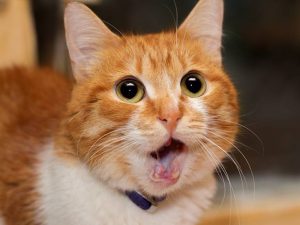
Age also naturally degrades the quality of vision, especially by a decrease in the transparency of the lens of the eye, which turns blue. The senior cat then suffers from cataracts, also known as senile cataracts. Regular eye maintenance will prevent any conditions that could aggravate the cat’s cataract.
However, who says difficulties to see, says difficulties to locate and orient themselves, even in known terrain. The elderly cat can nevertheless rely on his memory to make his usual movements, provided that the interior of the house is not frequently reorganized. The same is true for outdoor living: even though the garden has always been his favorite hunting ground, it can eventually turn into a maze for him. The cat’s loss of orientation skills often makes it more difficult to return home.
Owners are advised to avoid moving the furniture of their home as much as possible, to prevent the cat’s main journeys (place of rest to the place of feeding or disposal) from becoming an insurmountable difficulty. As for the outside, a good compromise if you don’t want to confine your companion inside can be to let out during the day under surveillance.
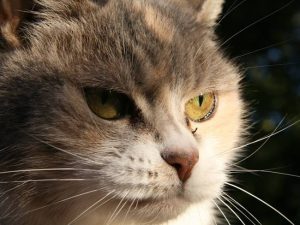
Moreover, if the cat sees poorly, the mere presence of its master may surprise it. When entering the room where his companion is, and especially if he is moving, the human may have an interest in announcing himself by talking to him kindly.
As he approaches, he can make him feel his hand before caressing him. Some experts say that the olfaction and perception of pheromones change little with age. By feeling his master, he will identify it more easily, and this will avoid any unnecessary cat stress…
-Hearing loss
Hearing loss is a natural and unavoidable phenomenon in older cats, sometimes as far as cat deafness. It touches both ears at the same time and in the same way. The animal gradually adapts to this sensory loss.
A cat that hears more and more badly can be afraid if it does not intend to arrive its owner or if the owner caresses him abruptly. To avoid such situations, you must always present yourself to the animal and let it sniff a hand before cuddling it.
Lifelong prevention plays an important role here: cleaning the cat’s ears at regular intervals prevents the organ from being degraded by repeated infections…
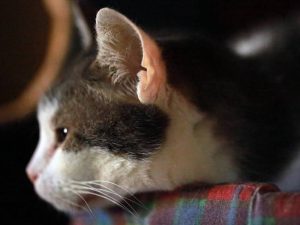
-insomnia
It is not uncommon for the senior cat to suffer from insomnia, meow excessively, or walk aimlessly at night in the home.
Several diseases can cause these symptoms, such as kidney failure or high blood pressure in the cat. In these cases, a visit to a veterinarian is recommended…
-behavior change
Often, the change in a cat’s behavior with age is observed through one or more traits of character that is increasing or changing, such as a cat that becomes a little more sticky, a cuddly cat that becomes a little less so or, on the contrary, an independent cat that starts to become more sticky.
Moreover, like humans, the cat becomes less tolerant with age: its pains are more numerous, its impatience is more pronounced … Keep in mind that an old cat needs calm and will react less well to stress than before. He will also be more afraid and may have unexpected reactions, sometimes seeming excessive.
As a result, you need to be gentler during cuddling sessions with a senior cat, and much more attentive to your reactions. For example, if he grunts when approaching him, he must be left alone: he warns, with his cat language, that he is not in a position to accept caresses.
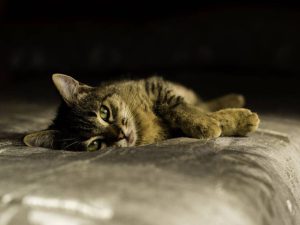
Leave a Reply